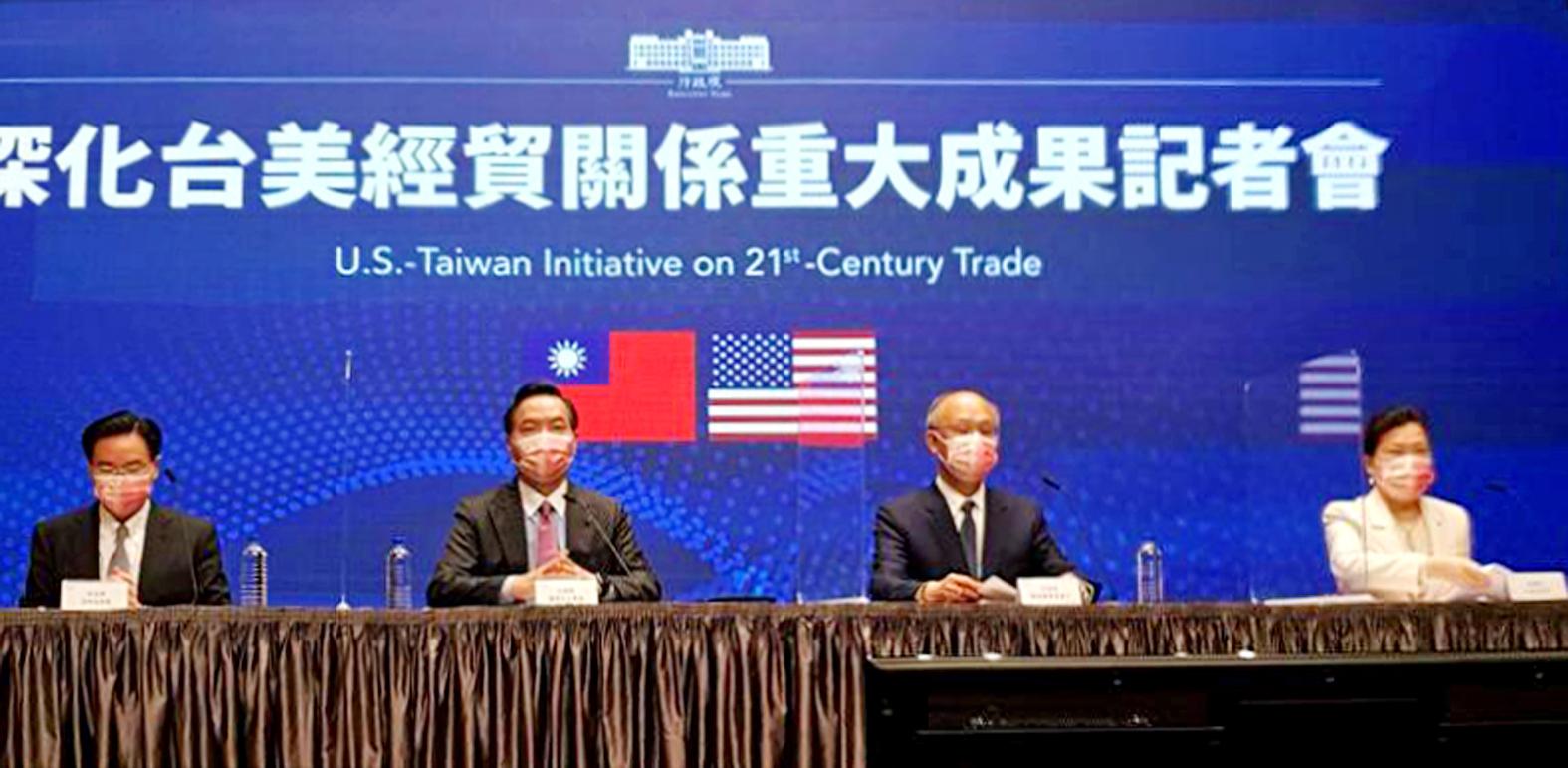Taiwan and the US yesterday announced that they would commence negotiations on a new trade agreement, dubbed the “Taiwan-US Initiative on 21st-century Trade,” signaling a breakthrough after Taiwan was excluded from a US-led regional trade framework.
The first round of negotiations would be held in Washington at the end of this month, Minister Without Portfolio John Deng (鄧振中) told a news conference in Taipei, adding that he would head the Taiwanese delegation to the US.
Deng made the announcement after an online meeting with Deputy US Trade Representative Sarah Bianchi, in which the two sides agreed on the initiative’s name.

Photo: Lee Hsin-fang, Taipei Times
The negotiations would cover 11 areas, but would not include tariffs, Deng said.
The 11 areas include trade facilitation, agricultural trade, fighting corruption, common standards on digital trade, workers’ rights, environmental regulations and state-owned companies, Deng said.
The bilateral initiative largely parallels US President Joe Biden’s Indo-Pacific Economic Framework (IPEF), an economic partnership with 13 Asian countries that he launched last week during a visit to Seoul and Tokyo. Taiwan was not included, although more than 200 members of the US Congress had called for its inclusion.
Deng said that although some of the initiative’s areas would overlap with those in the IPEF, Taiwan would continue working toward joining the regional agreement.
“For many years we have been hoping to launch trade talks with the US, and now the trade talks can officially begin,” Deng said. “This initiative provides us with a mechanism for talks, and Taiwan and the US aim to reach agreements on some topics and sign some agreements in the shortest possible time.”
Meanwhile, the two sides would continue the current Trade and Investment Framework Agreement (TIFA) talks, Deng said, adding that negotiations under the new initiative are intended to lead to the inking of new trade agreements, while TIFA talks focus on solving trade-related disputes.
The talks with Taiwan, led for Washington by the US Trade Representative’s office, would supplement several existing dialogues with Taipei, including one led by the US Department of Commerce on export controls and other supply chain issues, a US official said.
Like the IPEF, the initiative with Taiwan would not need US congressional approval because it would not include market access requirements or reduced tariffs, the official added.
The so-called US “fast track” negotiating authority for major trade agreements expired in July last year, and the Biden administration has not asked the US Congress to renew it.
“We think there’s a lot of robust areas that we can cover, that would really deepen our economic engagement, our economic ties, without dealing with market access issues, but, of course, obviously, we’re not ruling anything out for the future,” the official said.
A second official said the new initiative added to other efforts to “highlight the US commitment to the region, specifically economically.”
The US had lacked an economic pillar to its Indo-Pacific engagement since former US president Donald Trump quit a multinational trans-Pacific trade agreement, in part out of concern over US jobs.

CHAOS: Iranians took to the streets playing celebratory music after reports of Khamenei’s death on Saturday, while mourners also gathered in Tehran yesterday Iranian Supreme Leader Ayatollah Ali Khamenei was killed in a major attack on Iran launched by Israel and the US, throwing the future of the Islamic republic into doubt and raising the risk of regional instability. Iranian state television and the state-run IRNA news agency announced the 86-year-old’s death early yesterday. US President Donald Trump said it gave Iranians their “greatest chance” to “take back” their country. The announcements came after a joint US and Israeli aerial bombardment that targeted Iranian military and governmental sites. Trump said the “heavy and pinpoint bombing” would continue through the week or as long

TRUST: The KMT said it respected the US’ timing and considerations, and hoped it would continue to honor its commitments to helping Taiwan bolster its defenses and deterrence US President Donald Trump is delaying a multibillion-dollar arms sale to Taiwan to ensure his visit to Beijing is successful, a New York Times report said. The weapons sales package has stalled in the US Department of State, the report said, citing US officials it did not identify. The White House has told agencies not to push forward ahead of Trump’s meeting with Chinese President Xi Jinping (習近平), it said. The two last month held a phone call to discuss trade and geopolitical flashpoints ahead of the summit. Xi raised the Taiwan issue and urged the US to handle arms sales to

A magnitude 5.6 earthquake struck off the coast of Yilan County at 12:37pm today, with clear shaking felt across much of northern Taiwan. There were no immediate reports of damage. The epicenter of the quake was 16.9km east-southeast of Yilan County Hall offshore at a depth of 66.8km, Central Weather Administration (CWA) data showed. The maximum intensity registered at a 4 in Yilan County’s Nanao Township (南澳) on Taiwan’s seven-tier scale. Other parts of Yilan, as well as certain areas of Hualien County, Taipei, New Taipei City, Taoyuan, Hsinchu County, Taichung and Miaoli County, recorded intensities of 3. Residents of Yilan County and Taipei received

Taiwan has secured another breakthrough in fruit exports, with jujubes, dragon fruit and lychees approved for shipment to the EU, the Ministry of Agriculture said yesterday. The Animal and Plant Health Inspection Agency on Thursday received formal notification of the approval from the EU, the ministry said, adding that the decision was expected to expand Taiwanese fruit producers’ access to high-end European markets. Taiwan exported 126 tonnes of lychees last year, valued at US$1.48 million, with Japan accounting for 102 tonnes. Other export destinations included New Zealand, Hong Kong, the US and Australia, ministry data showed. Jujube exports totaled 103 tonnes, valued at